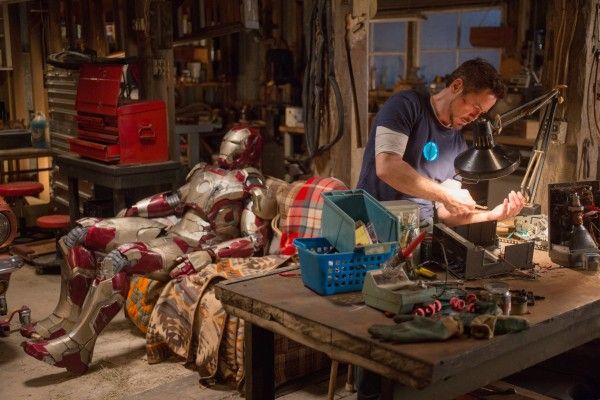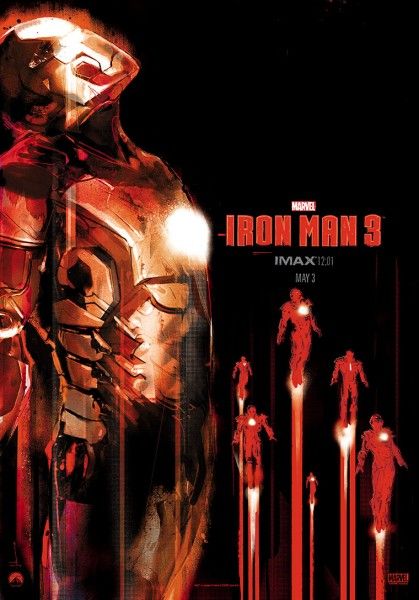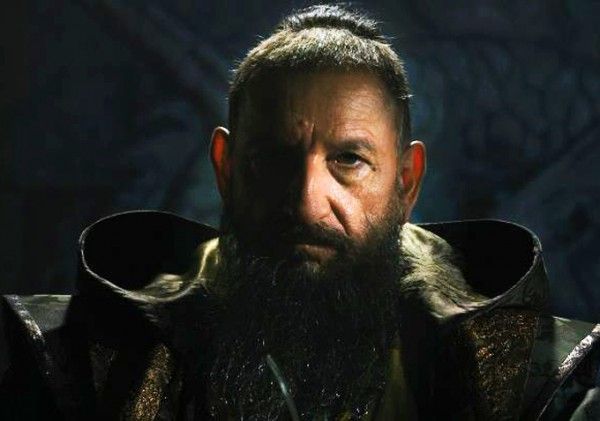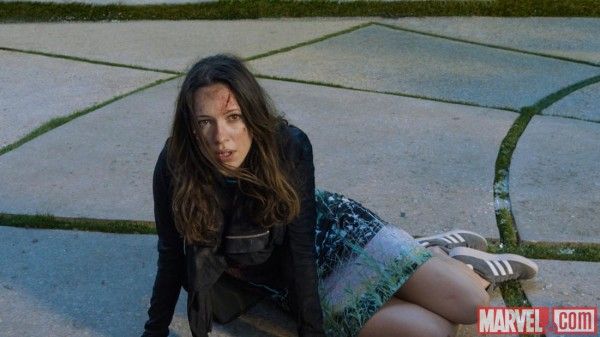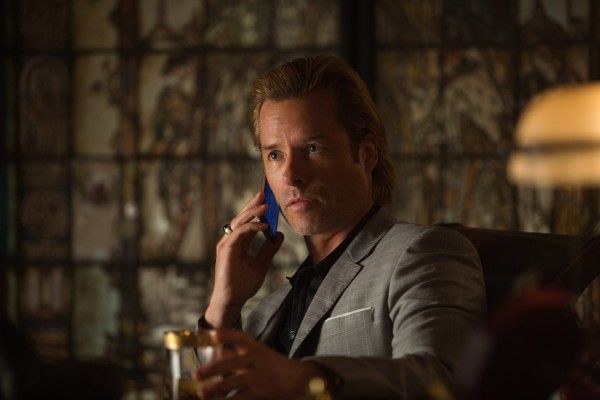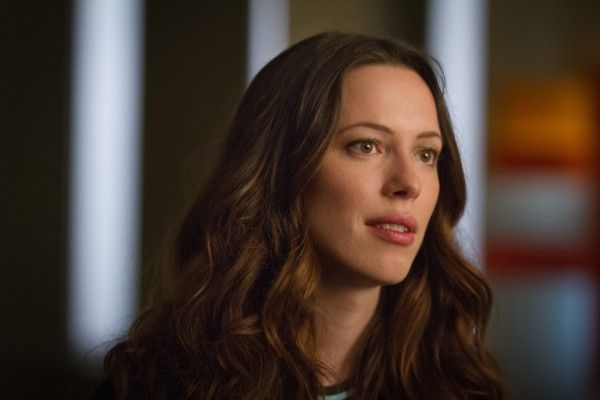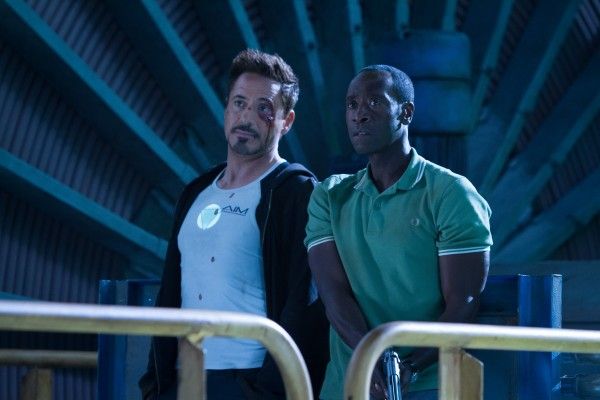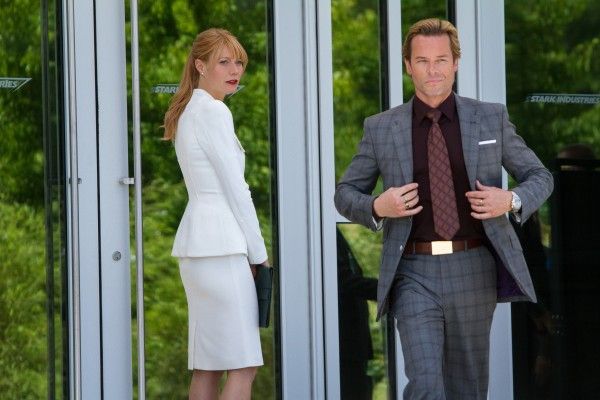Kicking off the blockbuster movie season, Marvel Studios is releasing Iron Man 3 on May 3rd. This time out, brilliant billionaire inventor Tony Stark (Robert Downey, Jr.), aka Iron Man, faces a terrifying enemy, known as The Mandarin (Sir Ben Kingsley), whose reach knows no bounds, and he must rely on his own instincts to protect those that he loves. From director Shane Black (Kiss Kiss Bang Bang), the film also stars Gwyneth Paltrow (“Pepper Potts”), Don Cheadle (“James Rhodes”), Guy Pearce (“Aldrich Killian”), Rebecca Hall (“Maya Hansen”) and Jon Favreau (“Happy Hogan”).
During this press conference at the film’s Los Angeles junket, co-stars Guy Pearce and Rebecca Hall, along with Shane Black, talked about the ambitions for Iron Man 3, the version that will be shown in China with additional footage, giving up the use of the F-word for the PG-13 film, why Christmas was the right setting for the story, what made this version of The Mandarin the perfect villain, and working with co-star Robert Downey, Jr. Check out what they had to say after the jump, and be aware that there are some spoilers.
Question: Shane, did your relationship with Robert Downey, Jr. on Kiss Kiss Bang Bang lead to your involvement with this film?
SHANE BLACK: I can only imagine that having worked previously with Robert contributed to him calling me and asking me aboard this somewhat more ambitious production. I had worked briefly with him, and sat with him and [Jon] Favreau, during the inception of the first Iron Man, in those early phases. I was impressed with the project and I was impressed with both of them. I got to work again with Robert Downey, and reunite and spend time with Jon Favreau, who gave me endless tips and advice on this thing, was just too attractive to pass up.
What were your ambitions for Iron Man 3?
BLACK: Our ambitions were to make sure that we had the movie that felt like a worthy successor to the two previous Favreau films. To Marvel’s credit, they said, “We’ve done The Avengers. We made a lot of money. But, let’s not do that again, right now. Let’s do something different.” And they allowed for a different, stand-alone film, where we got to be more character-centric and go back-to-basics with what Tony Stark would do next and what was left to tell of his story. That was very appealing to me. To make it more of a thriller and to make it more about Tony, and less otherworldly and grounded more, was our intention. I hope we succeeded.
What can you say about the version that will play in China and how much new footage there will be in the film?
BLACK: Well, we left out the giant dragon. The Chinese version will be an interesting surprise. I do know that there’s additional footage, which will be available in that version, that I’m sure will filter back here.
Did you cut that version yourself, and did you know some of the footage would be specific for China?
BLACK: There was an idea for the Chinese version and what it would entail, in additional footage that I was asked to look at and approve. I was busy doing the American version while we were simultaneously obtaining footage for the Chinese version, so I got a sense of what was going on. I got to look at, and had a chance later to approve, the footage. Now we have these two versions, and I’m just thrilled we had the opportunity to work with what is one of the single fastest emerging box office environments in the world, which is China, where they build theaters so quickly now.
Previously, you’ve been very well known for your R-rated action comedies, but you were working within the PG-13 rating for this. Was there anything you thought of that was a little too extreme for this? And how was it, giving up the F-word?
BLACK: You know, the F-word, tempting as it always is, especially in film environments, was pretty easy. I had done a film for kids previously, called The Monster Squad, but that was ages ago. Coming into this, I had to go back and say, “I remember what it was like when I went to the matinee to stand in line for Star Wars or Empire Strikes Back, and those types of films, and get excited again about that type of adventure that appeals to a family, but is still edgy. We didn’t want to pander. We didn’t want to make a kiddie film. But, we knew very well that we couldn’t go beyond the boundaries of PG-13. Tony only said “fuck” five times, in the first draft. There was a point, when you would write for television, when I was coming up in this business, you would just say “fuck” anyway and know that they would take it out later. But, there was no problem with that. I have no problem tailoring material to the audience it’s intended for. As long as you keep the edge and as long as you don’t condescend to that audience, I think that it’s absolutely spot-on.
Rebecca, in the past, you seemed amused by the idea of being in a superhero movie. What ultimately attracted you to this one?
REBECCA HALL: It sounds like a slightly flippant response, but it was a combination of “don’t knock it until you try it,” and this one seemed like one that would be very fun to try. I remember going to see the first Iron Man film and thinking, “What an unusual thing that they’re not casting action heroes. They’re casting Robert Downey, Jr. and Gwyneth Paltrow. This much be interesting.” I remember watching it and thinking that it’s not just about the action sequences and the thrill ride. It’s also about the repartee and the wit and the dialogue. There was something of a screwball, battle-of-the-sexes comedy going on that I loved. I thought this would be a great thing to be a part of.
Guy, what was it like to come to set and get used to the Marvel style of movie-making? Does Robert Downey, Jr. really set the tone?
GUY PEARCE: I don’t know if you got the sense of what Marvel movie-making is like, necessarily. Shane and Robert were leading the charge. In the end, lots of films feel the same, once you’re standing there in front of the camera, and you’re just trying to be convincing and do what you need to do. I think the interesting thing about doing this was that there were two previous films that were successful. Rebecca and I had seen both of those films and were big fans of them and really admired them. It was interesting to step into something that already existed. Obviously, working with Robert is something quite specific because he’s the genius that he is. He’s a lot of fun. He likes to improvise. You’ve really gotta be on your toes. But, every film you do feels very different from the last film that you’ve done. I didn’t think, “Oh, wow, this whole Marvel universe feels extremely different to anything else that I’ve done.” Obviously, we were really aware of the visual effects that were going on behind the scenes. There were literally rows of people sitting behind us at the monitors with laptop computers, mocking up versions of what things were going to look like, which doesn’t often happen on a $2 million Australian movie. So, that was different. You’re aware of the visual effects world that will be incorporated later.
Rebecca and Guy, did you have any trepidation about coming into this already-established franchise?
HALL: There’s trepidation when you get involved with any job, but I think it would be tremendously egotistical of me to suggest that I was, in some way, carrying the weight of the franchise. So, there wasn’t that kind of fear. It was more the fear that you get going to an amusement park and going on a scary ride. You know it’s exciting and you know it might be a bit scary, but you know it’s going to be fun, and you can get off and leave, at the end. Of course, any job is scary, but you tackle the challenges head on and hope for the best.
PEARCE: You do feel kind of nervous about any film you take on. If I feel inspired enough by a job to want to take it on, then any concerns that you have, you’re prepared to face. I don’t think I really had any concerns that would have stopped me from doing it. I’m certainly aware that there are a lot of fans behind comic book films, and obviously these Iron Man films, but you know you’re in good hands with these guys. Ultimately, you just want to make sure you can bring a truth to the character you’re playing.
Shane, a lot of your films take place during the holiday season. What is it that you like about setting a movie at Christmas time, and why did you feel that was right for Iron Man 3?
BLACK: Well, it just evolved, oddly enough, on Iron Man 3. I resisted it. It was Drew [Pearce] that talked me into it, eventually. I think it’s a sense of, if you’re doing something on an interesting scale that involves an entire universe of characters, one way to unite them is to have them all undergo a common experience, and there is something at Christmas that unites everybody. It already sets a stage within the stage. Whatever you are, you’re experiencing this world together. Also, there’s something pleasing about it to me. I did Lethal Weapon back in ‘87 and we did Christmas, and Joel [Silver] liked it so much, he put Die Hard at Christmas and there was some fun to that. You don’t have to do every film that way. I tried to explain that. But, it’s a time of reckoning for a lot of people. You take stock, as to where you’ve been and how you got to where you are now. Lonely people are lonelier at Christmas. You tend to notice things more keenly and more acutely. And Tony is meeting the ghosts of Christmas past, in the sense that Harley (Ty Simpkins) is kind of him, as a young boy. He encounters all these different things that come to him, almost like a fevered dream, when he’s at his lowest point. That was the idea, as well.
Originally you said you didn’t want to use The Mandarin because he was a racist caricature. Is that what led to The Mandarin evolving into what he is now?
BLACK: It’s part of it. More importantly, I just thought it was an interesting idea to try to mix it up. If you’re going to do something that involves a terrorist in a modern world, who’s just a guy that we’re all afraid of, why not say something about the entire experience of what it would take to create a myth that was all things to all people, and that drew from elements of traditional historic warfare, like swords and dragons, and surrounded itself with icons that were recognizable, like the beard from Fidel Castro and the field cap from Gaddafi. Why not make an uber-terrorist, and then play with the idea of that, and a corporate world of think tanks whose assignment was to cobble together the ultimate warfare specialist, and then have that man’s sole unifying characteristic be his undying hatred of America, such that he attracts to him these acolytes and disciples who respond to the myth. We thought that was an interesting idea, regardless of his ethnicity.
Guy, how was it to do all of the green screen work?
PEARCE: There was quite a lot of green screen stuff. I had done a bit of green screen stuff before. On some level, it’s actually kind of fun because you’re really relying on your imagination. With this, it wasn’t so extreme that you were trying to imagine a person in front of you that actually wasn’t there, or anything like that. And there was a visual effects team, working away constantly and showing you a pre-vis of the scene that you’re doing and how it’s actually meant to look. So, you’re in really good hands, on a visual sense, as well.
There’s 13 years of unspoken backstory and development with your character that doesn’t appear on screen. How much of that did you work out, as a part of creating the whole character?
PEARCE: That’s in the prequel. I’m not really sure. We just talked about the development of the company that he had begun and the effects that Extremis had, over that period of time. You see the progression of his look. It was just a matter of talking through that and making sure you understood it. We talked about when Pepper (Gwyneth Paltrow) would have worked for Killian and for how long, etc. But, it was fairly straightforward stuff to understand.
Were any more flashback scenes shot and then cut?
PEARCE: No, there wasn’t.
BLACK: I like to eliminate as much shoe leather as possible, which is to say, “If you don’t need it, don’t shoot it.” But, we have shoe leather, anyway.
Iron Man 3 opens in theaters on May 3rd. Click here for all our coverage.

